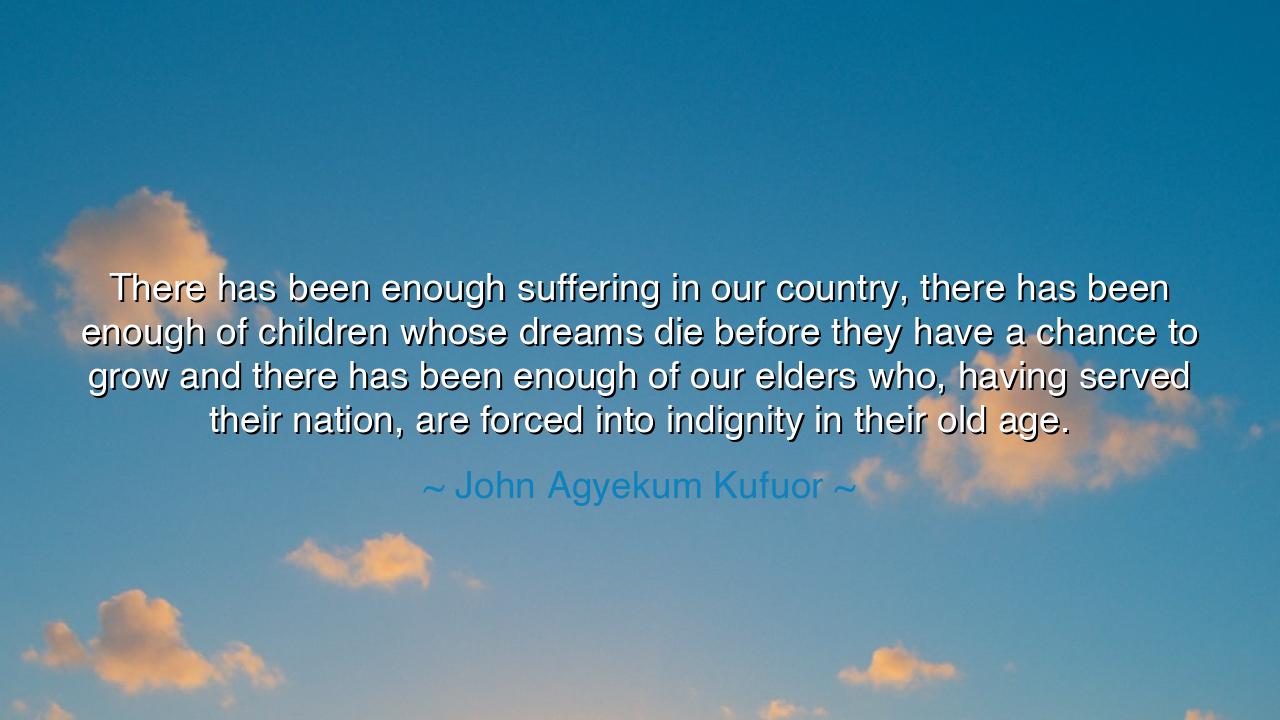
There has been enough suffering in our country, there has been
There has been enough suffering in our country, there has been enough of children whose dreams die before they have a chance to grow and there has been enough of our elders who, having served their nation, are forced into indignity in their old age.






In the great ebb and flow of history, there are periods marked by suffering and struggle, where the promise of a brighter future seems just out of reach. John Agyekum Kufuor, with a heart full of compassion and a vision for his nation, captures this painful reality when he says, "There has been enough suffering in our country, there has been enough of children whose dreams die before they have a chance to grow, and there has been enough of our elders who, having served their nation, are forced into indignity in their old age." These words are not just a lament; they are a call to action, urging us to confront the injustices that exist in our societies and to honor the dignity of every human being, young and old alike.
The ancients understood well the painful realities of life, and they spoke often of the deep responsibility that a society has to care for its most vulnerable. In Homer’s Iliad, we see warriors who, after serving their country with valor, are not only heroes on the battlefield but also men deeply concerned about the future and well-being of those who come after them. Achilles, the great hero, though filled with strength and power, is also portrayed as a man who is haunted by the knowledge that his actions affect more than just his own fate. Kufuor’s words echo this same responsibility—to not only serve the nation in times of strength but to ensure that the dreams of the young are not crushed and that the elders, who have given so much, are not cast aside in their final years.
Consider the example of Nelson Mandela, whose long fight against apartheid not only secured freedom for his people but also brought the dignity and rights of both the young and the old to the forefront. After spending 27 years in prison, Mandela emerged not bitter, but with a clear vision of a society where justice and equality would be prioritized. He worked tirelessly to ensure that South Africa’s elders—those who had given their lives to the struggle—would be treated with respect and dignity. His life exemplifies how a society should care for the suffering and sacrifices of its people, particularly those who have endured the harshest of circumstances. In Kufuor’s quote, there is a similar plea for justice for the elders, urging that their contributions not be forgotten or devalued.
Moreover, the children, those innocent souls with boundless potential, deserve a future filled with opportunities. Kufuor’s lament over the dreams of children that are crushed before they can grow speaks to the moral responsibility of society to provide the tools for growth and development. Plato, in his writings, emphasized that the education of the youth was the cornerstone of a just society. He believed that the future of the state depended on how its children were nurtured, not only in intellect but in character. The ancients understood that the well-being of the young is a reflection of the integrity of a nation. Just as Plato urged the city-state to invest in the education of its children, Kufuor calls for the nation to honor the dreams and aspirations of its future leaders.
In Kufuor’s words, we also hear a call to action, urging us to no longer stand idle while suffering continues, whether it be the youth whose potential is lost or the elders who are left to face the indignities of their final years alone. The ancients often spoke of the importance of action in the face of injustice. Aristotle believed that the good life was not simply about personal fulfillment but about the contributions we make to the greater good. The true measure of a society’s greatness, in his view, is not in its wealth or power but in how it treats its most vulnerable members—its children, its elders, and its oppressed.
In our own time, Kufuor’s message calls us to examine the state of our own societies. How are we treating the elderly who have served us? How are we nurturing the dreams of the young, ensuring they have the opportunities they need to succeed? As Socrates taught, we must look beyond ourselves and consider the impact of our actions on the broader community. To truly honor our elders and invest in the youth is to create a society that reflects the best of humanity—a society that values dignity, compassion, and justice.
Therefore, the lesson is one of responsibility and compassion. We must take the suffering of others seriously, not as a distant concern but as a call to action in our own lives. Just as Mandela worked to heal the wounds of his nation, so too must we work to ensure that the dreams of our youth are not crushed by the weight of injustice and that the elders who have sacrificed so much are treated with the respect they deserve. In doing so, we create a society that upholds the highest ideals of humanity—one where hope and dignity are not fleeting, but everlasting.






AAdministratorAdministrator
Welcome, honored guests. Please leave a comment, we will respond soon